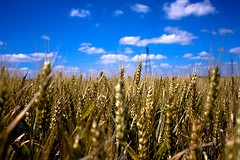The main crux of her argument is that it’s not just that normal wheat is the problem. There may be certain chemicals and processes involved in the farming of a lot of wheat that causes the “gluten intollerant” reaction
Stephanie Seneff is a senior research scientist at MIT. Based in the university’s Computer Science and Artificial Intelligence Laboratory, Seneff’s focus is, according to her web page, “the intersection of biology and computation.” She is also, according to many in the science community, a “quack,” meaning a poseur at the business of science, and a practitioner of pseudoscience.
In recent months, Seneff co-authored two papers proposing a connection between the herbicide glyphosate and gluten sensitivity. I spoke with Seneff by phone about this hypothesis, her transition from computer science into biology, and her reputation in the scientific community.
Ari LeVaux: How is it that, in your opinion, glyphosate causes gluten sensitivity?
Stephanie Seneff: What we argued in the paper is that glyphosate binds to the gluten. Gluten usually forms cross-mesh connections between different amino acids, and glyphosate would disrupt that because it would prevent the cross-mesh by binding to the gluten and causing the gluten to stay in the form that is known to be more allergenic. So we believe glyphosate causes the gluten to assume the form that is more allergenic.
ALV: You think this applies to both Celiac disease and gluten sensitivity?
SS: Gluten sensitivity by itself doesn’t necessarily have the transglutaminase immunogenicity of Celiac. It shares the same features with Celiac disease, but it’s not as extreme. But these things also have a host of other pathologies that are associated with this particular condition of gluten sensitivity, which is what’s so fascinating to me. All of these risk factors that co-occur with Celiac disease could be explained through other ways that glyphosate disrupts physiology. That’s the most fascinating thing to me, is that you can explain all of these other things, maybe not directly through the effect of gluten but through the effect of glyphosate on the body.
SS: Glyphosate is being sprayed on wheat right before the harvest. This has become a more and more popular practice among farmers. We found specific data in the UK showing a dramatic increase in the practice of spraying the wheat with glyphosate right before the harvest. This is three or four days before they harvest the seed. You can’t imagine that that glyphosate has disappeared in those three or four days. The intent is to kill the plant.
Wheat, of course, is not GMO, it’s not Round-Up ready. They probably don’t want it to be Round-Up ready because then they couldn’t do this anymore. This is a very convenient practice. It reduces the effort involved in the combine when you’re harvesting the wheat.
ALV:If glyphosate were causing these problems, wouldn’t we expect to see higher incidence of these diseases that are supposedly caused by glyphosate?
SS: One thing we certainly see in Sri Lanka and in El Salvador is agriculture workers who are working in sugarcane fields that are sprayed with glyphosate right before the harvest just as wheat is: these workers are dying at a young age from kidney failure. And people with Celiac disease are at a high risk of kidney failure. And we can see how glyphosate would kill the kidney, because you get into an overgrowth of pathogenic bacteria that produces p-cresol, which is very toxic to the kidney.
ALV:If you had a lab, what experimental research would you do to test your theory on glyphosate and Celiac disease?
SS: Take people with Celiac disease and put them on an organic diet. Or take people with inflammatory bowel disease, because that’s sort of related—in fact, a paper was just published where they put people with inflammatory bowel disease on an organic wheat diet. This wheat was an ancient heirloom wheat.
Thank you to the interviewer and the scientist for speaking openly on a topic that ruffles a lot of feathers. People and big corporations get really mad when you challenge their business processes and beliefs.
you can read the very well written full article from Ari LeVaux
photo by Kevin Lallier
